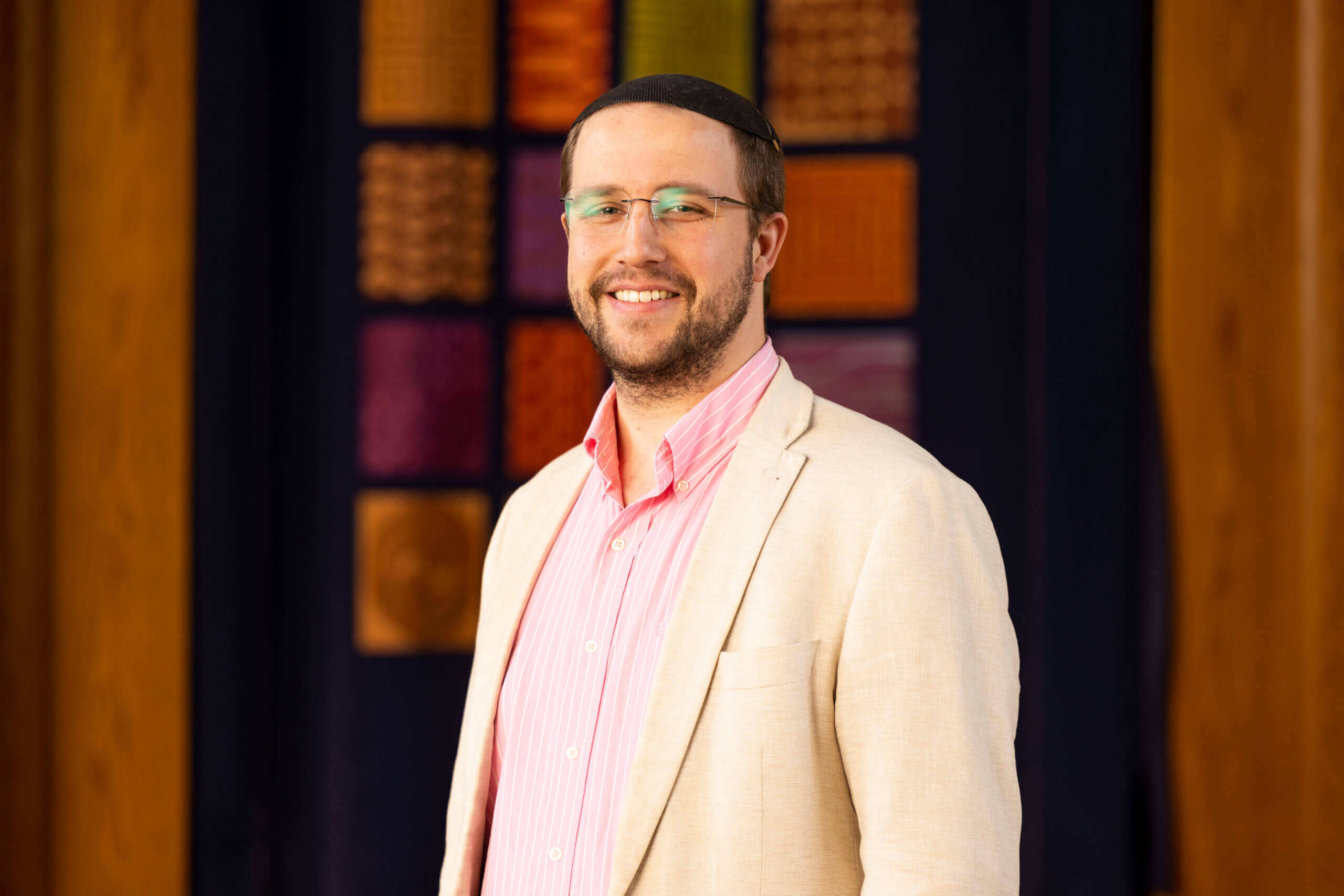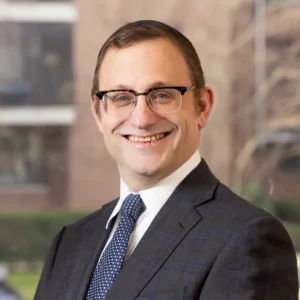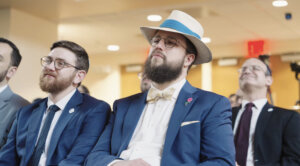Yeshivat Chovevei Torah, New York Orthodox rabbinical school, ordains an out gay rabbi
The men’s seminary, known as a center of Orthodox Jewish innovation, plotted a new course after controversial 2019 decision

Yeshivat Chovevei Torah ordained Rabbi Tadhg Cleary in June. “The pressure comes from knowing that I have these abilities and I can be effective, and whether or not I do it is up to me,” he said. Courtesy of Tadhg Cleary
Louis Keene covers Orthodox life and news generally for the Forward, including Jewish LGBTQ+ issues. In 2023, he profiled the first out gay rabbi serving on the clergy of an Orthodox congregation. Earlier this year, he wrote about a landmark agreement for queer Orthodox yeshiva students, the revolt against it, and how it fell apart.
The leading liberal Orthodox rabbinical school quietly ordained an out gay rabbi this summer, marking a first for an Orthodox Jewish institution in the U.S.
Yeshivat Chovevei Torah, an all-male seminary in Riverdale, New York, ordained Rabbi Tadhg Cleary in a June 12 ceremony alongside three other graduates.
Cleary’s ordination, or semicha, came six years after YCT’s controversial refusal to ordain a different gay student whose public wedding engagement went viral. The same rosh yeshiva (head of school) who made that decision, Rabbi Dov Linzer, gave final approval to Cleary’s admission into the program and conferred his ordination, the significance of which has not been previously reported.
That a gay man was on a path to ordination was widely known at the yeshiva and in Orthodox LGBTQ+ spaces. Cleary came out to the YCT administration before he applied and accepted his admission on the condition that he could be fully out as a student. It was also public if you knew where to look: Cleary came out as queer in a 2023 blog post that the school links to on its website.
Until Cleary and the yeshiva were contacted by the Forward, however, they had planned not to discuss his ordination publicly, wanting to avoid a discourse that has been taxing to the school and which, in their view, is not pertinent to Cleary’s qualities as a rabbi.
In an interview, Linzer called Cleary “an enormous talmid chacham,” or Torah scholar, “who is God-fearing, scrupulous in his observance and happens to be gay.”
“We want to be giving semicha to him for the totality of who he is, not to turn him into a symbol or a statement,” Linzer said. “If we were interested in making a statement, you would have heard about it from us first.”
Statement or not, the yeshiva’s ordination of an out gay man breaks new ground for Modern Orthodoxy, a movement that attempts to combine engagement with secular ideas with a total commitment to halacha, or Jewish law.
The movement’s belief that the Torah explicitly forbids same-sex intercourse has long alienated queer Orthodox Jews, and proven challenging even for leaders who want to welcome them. Efforts to expand inclusion in Modern Orthodox spaces have been slow-moving and generally occurred below the radar; when they become public knowledge — like at Yeshiva University, whose official LGBTQ+ student club lasted just 50 days — the ensuing controversy can derail them.
Cleary, a native of Wellington, New Zealand, is one of a growing number of gay Orthodox Jews who, in spite of the movement’s tentative if not outright hostile orientation toward them, are pursuing community leadership. His semicha is the culmination of 14 years of post-secondary Torah study that began with nearly a decade at one of Israel’s most prestigious yeshivas.
“The idea that I wanted to be a rabbi has been with me for a long time,” Cleary, 32, said in an interview. “The thing that I came to realize was that it was not a binary choice — I did not have to distinguish between my life as a frum (observant) person and my life as a gay man. In fact, to live my life fully as a frum person meant to live my life as a gay man, because if the Torah is to speak to us and uplift us and sanctify us, then it must speak to the real us.”
Ordination also releases Cleary, who plans to marry his current partner, from the yeshiva’s rule that he could not wed while enrolled in the program. Linzer said that while the yeshiva was not prepared to give semicha to a man in a same-sex marriage, it respected that there were “different paths of dealing with a very challenging reality.”
“We trust somebody we’re giving semicha to to be making responsible decisions when they leave the yeshiva — responsible from the perspective of the Orthodox community and from halacha,” Linzer said.
Navigating Jewish law
Yeshivat Chovevei Torah (meaning “Lovers of Torah”) is today the flagship of Open Orthodoxy, a movement that pursues a more empathetic reading of Jewish law than traditional Modern Orthodoxy. Since its founding in 1999 by the pioneer of that movement, Rabbi Avi Weiss, the yeshiva has advocated for expanded religious roles for women and people with disabilities. The central innovation of YCT’s semicha program, which has produced 155 rabbis to date, is its focus on pastoral care training.
But LGBTQ+ inclusion has not come easily for the yeshiva. In 2019, its treatment of a gay student drew criticism from across the spectrum of Orthodox observance. The student, Daniel Atwood, had come out to the yeshiva after he began study there, but after Atwood got engaged onstage at a concert, the yeshiva refused to ordain him.

Linzer, 59, said publicly at the time that Atwood had otherwise been on track to receive ordination — appalling Orthodox Jews to the yeshiva’s right — and admitted that he had handled the reversal poorly; alumni, students and Linzer’s predecessor slammed the school in the press for changing course. (Linzer said he stands by his decision, but declined to elaborate; Atwood eventually received semicha from an Israeli seminary.)
As a result of the fallout, the school created an advisory committee to develop an admissions policy for gay applicants. But the committee could not agree on a policy, and decided instead to weigh each prospective student individually moving forward.
The yeshiva’s agreement with Cleary was in one sense the same as for any other student: he could date, but not live with a partner out of wedlock. (The school had previously asked a student it learned was living with a female partner to leave, Linzer said.) The rule about marriage, of course, was different.
“Clearly, every student, gay or straight, has to be fully halachically observant,” Linzer said. “And the Torah is very clear about certain prohibitions in the sexual realm between men and women and between men and men. Beyond that, the issue about gay marriage is an issue that’s very fraught in the Orthodox community, and it’s certainly complicated halachically.
“While the yeshiva is working to create more welcoming communities and exploring paths” that would allow same-sex intimacy under halacha, Linzer continued, “given those current realities, we are not prepared at this stage to give semicha to a man who’s married to another man.”
The yeshiva obliged Cleary’s desire to be fully out and write about his identity publicly, and Cleary said he understood the delicate political and religious balance the yeshiva sought. If getting married during those four years had been critically important to him, he would not have enrolled. Nevertheless, he said, “One of the hard pieces about being at YCT was watching so many of my friends and colleagues get married and engaged while I was there.”
“As respected and appreciated and valued as I was in the Beit Midrash,” Cleary added, “there was a part of my existence and experience that I couldn’t fully bring.”
The Jewish law on queer sexuality is less thorny for women: The Orthodox women’s seminary founded by Weiss, Yeshivat Maharat, published responsa in 2023 permitting two women “to build a home together,” and ordained a woman in a same-sex marriage a few days after YCT ordained Cleary.
Meet the rabbi
Cleary comes to the rabbinate with deep and varied experience in Orthodox communities around the world. He has served as a rabbinic intern at synagogues in Riverdale and Philadelphia; in New Zealand, he has run youth camps, led high holiday services and even overseen kosher industrial slaughter.
His interest in YCT developed as two things became clear to him: He was gay, and the only yeshiva he ever knew no longer welcomed him.
His attraction to the rabbinate came much earlier. Tadhg (pronounced like “tiger,” without the –er) Seamus Cleary grew up in Wellington, New Zealand, in a household that occasionally lit Shabbat candles, attended holiday services at the local Progressive synagogue — a denomination akin to Reform in the U.S. — and not much else. But an encounter with the Torah at age 12 set him on a path toward observance.
It was fate, or divine providence: His bar mitzvah portion was Acharei Mot-Kedoshim, which contains the two verses forbidding sex between men. Cleary already knew he was attracted to other boys.
“It was really confronting for me to see that verse in black and white,” Cleary recalled. “And of course, it raised all sorts of questions for me. Like why would God forbid it, and what’s wrong with it, and what did it mean for me as a gay kid?”
Far more disturbing to him, though, was how his tutor had related to the verse: “She looks up from the page,” said Cleary, “and says, ‘But we don’t follow this.’ Puts her head down and keeps reading.”
Her dismissiveness had the opposite effect: It made him curious. He started learning on his own — first by reading the Torah, then going deeper online, then through YUTorah podcasts; at 15, he was wrapping tefillin daily, observing Shabbat and keeping separate kosher dishes.
After high school, he ventured to Israel for a gap year at Yeshivat Har Etzion, a bastion of Religious-Zionist Torah study that is both waystation and lodestar for many of Modern Orthodoxy’s most revered leaders. The gap year turned into two, then three. Then he returned to Wellington to work toward a degree, but arranged to spend his college summers — November to February, the heart of the Israeli calendar — back at the yeshiva.
“We do what we think is right even if it leads to certain reactions.”Rabbi Dov Linzer
Cleary said he did not give up on the idea of marrying a woman until 2020, his ninth year at Har Etzion. By then, he was serving as a madrich, or adviser, for gap year students, and he sought his superiors’ permission to come out to his charges. Cleary said their answer was that he could either be out or keep his job — not both. He stayed closeted and started looking for a new home. (Rabbi Mosheh Lichtenstein, a rosh yeshiva at Har Etzion, declined to comment, saying it was his policy not to discuss students in the press. Two other administrators at the yeshiva declined comment or did not respond.)
“I still wanted to be a rabbi,” Cleary recalled. “But I was no longer looking to rabbis in the yeshiva as a source of religious inspiration. I could pick up the Shulchan Aruch and learn on my own. If I was going to be in yeshiva, it was to be inspired and grow and develop.”
He reached out to Rabbi Steven Greenberg, who in 1999 became the first Orthodox rabbi to publicly identify as gay. Greenberg suggested YCT, then reached out to Linzer on Cleary’s behalf. After a series of discussions with Linzer, Cleary enrolled in January 2022.
“We were all sort of entering with an awareness that it was not going to be simple and a commitment to make it work,” Linzer said.
A pivotal moment

Three-and-a-half years later, YCT hopes a bumper crop of eight incoming rabbinical students signals an end to a lean period for their semicha program. The school enrolled just one student in the 2024-25 school year and three the year prior.
The sparse numbers reflect declining rabbinical school enrollment across denominations, but also efforts by some Orthodox umbrella organizations to marginalize the yeshiva over its progressive approach. The Rabbinical Council of America, which represents Orthodox rabbis, has never accredited YCT, effectively blocking its graduates from clergy positions at many Orthodox shuls. The Orthodox Union, which had once hired YCT graduates to lead campus outreach programs, stopped more than a decade ago; several of its campus leaders today have no ordination at all.
As its rabbinical school enrollment declined, the yeshiva planted roots in Israel, where post-ordination programs have flourished, training dozens of rabbis on halachic adjudication and pastoral care. But the central work of the institution, Linzer said, remains training new Orthodox rabbis.
He knows perhaps better than anyone the backlash Cleary’s ordination could ignite, and he recognizes that his decision could redound not only to the institution, but also to its alumni as they progress in their careers. And while he hopes Orthodox Jews see that the yeshiva has stayed within the boundaries of halacha, Linzer acknowledged that some people and organizations “are going to hate us no matter what.”
“And at the end of the day, we have to do what’s right,” he said. “I guess that’s part of the story of the yeshiva. We do what we think is right even if it leads to certain reactions.”
Correction: The article previously misstated the denomination of the seminary that ordained Rabbi Daniel Atwood. It identifies as “pre-denominational,” not nondenominational, and confers Orthodox semicha.















